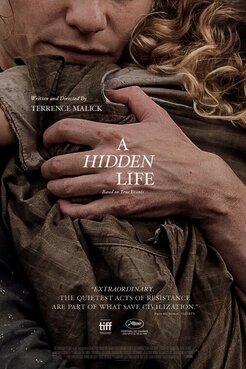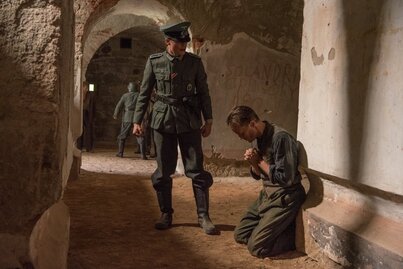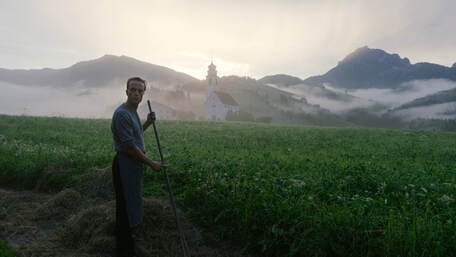
is also advised – this film is rated '12'.
Films are rarely as quiet, contemplative and visually resplendent
as Terrence Malick’s A Hidden Life. From Days of Heaven to The Tree of
Life, Malick has crafted visual feasts for the eyes which are at
once ethereal, but completely real. His landscapes are Eden-like
utopias, free of darkness and teeming with life. And such is the case with
A Hidden Life, Malick’s long-gestating WWII project, which artfully
depicts the life of Austrian Franz Jägerstätter - a conscientious
objector during World War II who, at the age of 36, was put to death for
his refusal to fight for Nazi Germany. A committed Christian, Franz’s
life was marked by devotion to the Lord, and his refusal to side with
evil led to him being declared a martyr and beatified by the
Catholic Church in 2007.
Whilst his sacrifice was relatively unknown for a number of years,
Malick’s film highlights this courageous act of defiance and the
abuse Franz endured, in a manner which many have commented
shares parallels with issues of the present day. However, I felt that the primary interest of Malick’s film is to display sin and darkness as the destructive forces which “so easily entangles” (Hebrews 12:1, NIV) us.
When Franz is later confronted with evil at his door, embodied in a local fascist who persistently berates him for not “supporting the war effort”, and pledging allegiance to Adolf Hitler’s Germany, he is simply unable to make sense of it all. “Don’t they know evil when they see it?”, a friend asks in total disbelief. It’s in these scenes that I spent time considering how painful it must have felt, as a Christian in particular, to watch an oppressive regime rise up unexpectedly around you, attempting to force you into standing for something you were called to stand in direct opposition against. I was surprised that such blatant evil could find itself accepted by so many, but the Bible teaches that we shouldn’t be:
(2 Corinthians 4:4, NLT)
For the remainder of the film, we spend much time with Franz as he is bullied, tortured and forced to live out his day-to-day life with extreme restrictions put in place. He makes the most of the little freedom that he has, in gazing upon God’s creation throughout his daily exercise or writing to his beloved wife and family. The oppressive nature of his incarceration is almost unbearable to watch, let alone experience it for ourselves. And yet, Franz is given many opportunities to sign the oath of allegiance – the act of which he is told will set him free. But he never signs this piece of paper – much to the bewilderment of his attorney and us, the audience. “Sign this paper and you’ll go free,” his attorney tells him. “But I am free,” Franz says firmly.
A Hidden Life could therefore be classed as a tale of positive rebellion. Franz’s defiance to compromise upon his faith and betray Christ and His teachings, is a result of his life being changed by the life-saving power of God. His dedication to praying alongside his wife, and holding the Bible closely as the couple’s “book of reference for everyday life”, meant that Franz was not only a new creation in Christ, but was seeking to be transformed into His perfect image. In doing so, Franz also knew and understood that to refute God’s teachings (thereby sinning against God and his neighbour), would mean to imprison oneself in the binding grip of sin, leading to an eternal death even after death in this life. For James 4:17 (NLT) teaches us that “…it is sin to know what you ought to do and then not do it”. So, despite sacrificing his physical freedoms for that which he knew to be right, Franz chose to and was able to trust in the promises of God, because of a depth of relationship between him and the Father. Franz’s defiance in the face of sin, though he knew it would cost him everything, will bring him life everlasting in Heaven. For Jesus taught, “if you give up your life for me, you will find it” (Matthew 10:39, NLT).
Franz’s rebellion against the darkness which surrounded him, acts as a bold embodiment of the rebellion against evil and our fallen natures, which Jesus Himself has called humanity to. We could live in the comfortability which comes with our sin, and a general acceptance of the evils which surround us, but it is God’s will that we rebel against “evil rulers and authorities of the unseen world” and “against mighty powers in this dark world” (Ephesians 6:12, NLT). But each and every one of us has ultimately invited such darkness into our lives and compromised ourselves in so many ways. For the Bible teaches that “everyone has sinned” (Romans 3:23, NLT) and done wrong in God’s sight. In fact, every one of us have “fall(en) short of God’s glorious standard” (Romans 3:23) for the way we should live our lives. Therefore, we deserve to receive the “payment for sin (which) is death” (Romans 6:23, ICB), in accordance with God’s law.
Biblically speaking therefore, humanity cannot avoid eternal death as a result of our sin – because no matter what we do, we cannot free ourselves from sin’s effects which severely effects our lives both here, and in eternity. But God, in His great love for the world, is merciful, and “gives…the free gift of life forever” (Romans 6:23, ICB) to anyone who asks for forgiveness from their sin, turns away from their old life and comes to faith in God. It was through Christ alone, God’s one and only Son, who's life was cruficified on the cross as a sacrifice - the “…offering for our sin”, so “that we could be made right with God through Christ” (2 Corinthians 5:21, NLT). Just as God gave Franz the strength to rebel against the darkness which surrounded him, so too has he made a way for us to rebel against and be freed from sin’s imprisonment of the soul and be united in relationship with Him today.
Challenge:
Why not prayerfully invite a friend or family member who doesn’t yet know Jesus, to watch A Hidden Life for themselves? Use the film’s themes to ask them what they thought of the film, if they spotted any links to Christianity and what they might think of the Gospel’s response to this subject.
If you feel able to, ask them what they think about Franz being prepared to die for what he knew to be right – was he justified in his decision, or misguided? What do they think about being prepared to give up one’s life, for something/someone greater than themselves? Jesus said, “there is no greater love than to lay down one’s life for one’s friends” (John 15:13, NLT). But Jesus, despite not even knowing us, laid down His life for humanity to free us from imprisonment of the soul – how does that make your friend feel? Later, if they're open to hearing it, take an opportunity to share the hope of the Gospel message with them.
Prior to watching the film for yourself, however, take a moment to pray that God would speak to you through the film. If you feel comfortable, pray this prayer over all of your future, film-watching experiences:
Dear Lord, As I watch this film, I ask that you would be present here with me. Highlight to me anything within it that is honourable, anything that can be used in conversation for your Kingdom purposes. Amen.
A Hidden Life is available to rent through Amazon Prime Video



 RSS Feed
RSS Feed